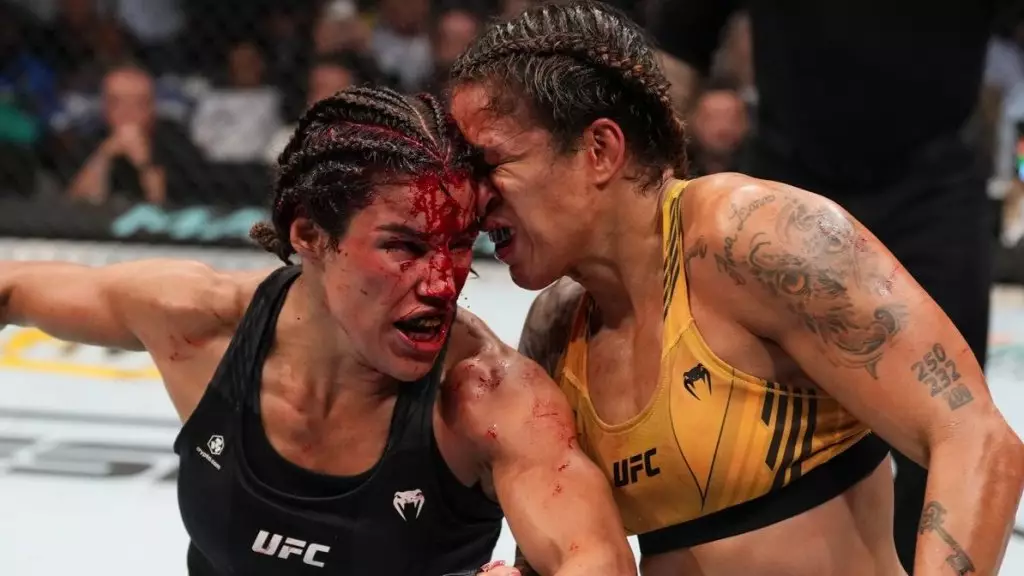As the landscape of women’s MMA continues to evolve, two prominent fighters have emerged at the forefront of the bantamweight division: Julianna Peña and Kayla Harrison. Their recent exploits in the octagon have stirred up discussions regarding title aspirations and the readiness of contenders. Following Peña’s narrow victory over Raquel Pennington at UFC 307 to reclaim her bantamweight title, the air is thick with anticipation for her potential clash with Harrison, a two-time Olympic gold medalist currently making waves in the UFC.
Peña’s performance against Pennington showcased her resilience and adaptability. However, her recent success has been overshadowed by her pointed criticism of Harrison’s readiness to step into the title contender role. Despite Harrison’s victory over Ketlen Vieira, where she displayed her grappling prowess while enduring the unthinkable—urine blood during her weight cut—Peña remains skeptical. She emphasizes that Harrison’s physical struggles during the preparation period signal that Harrison may not be poised to capture the title just yet.
Peña’s assertion has merit. When an athlete’s health is called into question, particularly in a sport that demands precision, endurance, and peak physical condition, it leads to serious doubts about their potential performance in high-stakes situations. The implications of Harrison’s condition during her weight cut raise flags not just about her ability to make the bantamweight limit but imply underlying concerns regarding her preparation and conditioning.
What complicates the matter further is Julianna Peña’s insistence on completing her trilogy with Amanda Nunes, with whom she has split their two title fights. Nunes’s sudden retirement adds an air of uncertainty to the division. Peña appears to be using this situation to assert her dominance, declaring that her focal point should be addressed before any consideration of a fight with Harrison.
In the eyes of Peña, her experience inside championship bouts, coupled with her previous victories over Nunes, strengthens her claim to the title as she navigates the complex dynamics within the division. She employs a strategic approach by focusing on unfinished business with Nunes, insinuating that challengers like Harrison who have yet to prove themselves should wait their turn. This perspective not only bolsters Peña’s positioning but highlights a hierarchy that often exists within competitive spheres.
Criticism of Harrison doesn’t stop at her struggle with weight management; Peña has also taken issue with Harrison’s performance against Vieira. While Harrison’s grappling capabilities are without dispute, Peña’s comments suggest that she was underwhelmed by Harrison’s octagon presence, calling her performance “average” in the realm of elite competition. The implicit challenge extends beyond just a fight; it questions Harrison’s readiness for the rigors of a championship match that entails five exhausting rounds.
Harrison’s claim that she could make championship weight does not seem guaranteed. The potential for her to struggle in a longer fight scenario, particularly against a skilled, full-round competitor like Peña, is a substantial concern. This reflects a broader narrative within the sport, where the ability to maintain performance across the full duration of a championship match is pivotal for success.
The discourse surrounding Peña and Harrison is emblematic of a broader narrative occurring within women’s MMA, where fighters work diligently to assert their dominance and claim title shots. As they navigate this intricate landscape, fans and analysts alike are keenly observing their interactions, predictions, and performances. While the path to a potential bout between Peña and Harrison remains uncertain, it holds significant implications for the future of the bantamweight division.
Ultimately, Julianna Peña’s assertion that Kayla Harrison needs to “get in line” encapsulates the ongoing competition within women’s MMA. As challengers vie for title recognition, the focal points of strategy, preparation, and ultimate performance are scrutinized, influencing the trajectory of fighters’ careers. With unfinished business lingering and debates brewing, the octagon remains a dynamic arena where physicality and strategy are relentlessly tested.

